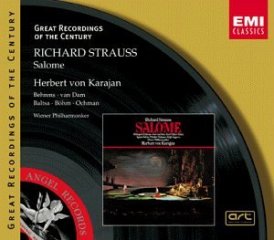Richard Strauss – Salomé (Karajan) [1978/1999]
Richard Strauss – Salomé (Karajan) [1978/1999]

Disc: 1 1. Wie Schon Ist Die Prizessin Salome Heute Nacht! - Kurt Rydl 2. Nach Mir Wird Einer Kommen - Kurt Rydl 3. Ich Will Nicht Bleiben - Hildegard Behrens 4. Siehe, Der Herr Ist Gekommen - Kurt Rydl 5. Jauchze Nicht, Du Land Palastina - Kurt Rydl 6. Du Wirst Das Fur Mich Tun - Wieslaw Ochman 7. Wo Ist Er, Dessen Sundenbecher Jetzt Voll Ist? - Wiener Philharmoniker 8. Jochanaan! Ich Bin Verliebt In Deinen Leib - Jose Van Dam 9. Wird Dir Nicht Bange, Tochter Der Herodias? - Jose Van Dam 10. Wo Ist Salome? Wo Ist Die Prinzessin? - Agnes Baltsa 11. Es Ist Kalt Hier - Agnes Baltsa 12. Salome, Komm Trink Wein Mit Mir - Agnes Baltsa 13. Sieh, Die Zeit Ist Gekommen - Agnes Baltsa 14. Wahrhaftig, Herr, Es Ware Besser - Agnes Baltsa 15. Siehe, Der Tag Ist Nahe - Agnes Baltsa Disc: 2 1. ...Eine Menge Menschen Wird Sich Gegen Sie Sammeln - Agnes Baltsa 2. Tanz Fur Mich, Salome - Agnes Baltsa 3. Tanz Der Sieben Schleier - Wiener Philharmoniker 4. Ah! Herrlich! Wundervoll! Wundervoll! - Wiener Philharmoniker 5. Still, Sprich Nicht Zu Mir! - Agnes Baltsa 6. Salome, Bedenk, Was Du Tun Willst - Hildegard Behrens 7. Wer Hat Meinen Ring Genommen? - Agnes Baltsa 8. Es Ist Kein Laut Zu Vernehmen - Wiener Philharmoniker 9. Ah! Du Wolltest Mich Nicht Deinen Mund Kusssen Lassen - Hildegard Behrens 10. Sie Ist Ein Ungeheuer, Deine Tochter - Agnes Baltsa 11. Ah! Ich Habe Deinen Mund Gekusst, Jochanaan - Hildegard Behrens Hildegard Behrens (Salomé) Jose van Dam (Jochanaan) Karl-Walter Böhm (Herodes) Agnes Baltsa (Herodias) Wieslaw Ochmann (Narraboth) Heljä Angervo (Page der Herodias) Wiener Philharmoniker Herbert von Karajan (Conductor)
Herbert von Karajan's mastery of the opulent idiom of Richard Strauss is everywhere apparent in this recording of Salome, made in 1977-78 in conjunction with the first-ever Salzburg Festival production of the opera, conducted (as well as directed) by the Salzburg-born maestro. Never has the shimmering, feverish intensity of Strauss's colorful scoring been more tellingly captured on disc, although Karajan's fastidious direction and iron grip on the music are only a part of the reason: a good deal of credit belongs to the Vienna Philharmonic, which was in top form on this outing. As Salome, German soprano Hildegard Behrens makes a strong impression. This was the production that brought her into the international spotlight, where she would remain for a dozen years or so, eventually singing Brünnhilde at Bayreuth and the Met. Although a newcomer, she was a mature artist--40 years old--with a potent instrument. While her approach might lack the hair-raising intensity that Ljuba Welitsch brought to the part (to name another Karajan collaborator, and one of the century's greatest Salomes), it fit Karajan's conception of the role like a glove. José van Dam makes a regal Jochanaan, and Karl-Walter Böhm gives a smarmily spot-on characterization as Herodes. The ensemble work is superb, once again reflecting Karajan's scrupulous attention to detail. The recording, made in the Sofiensaal and engineered by a Decca team that was headed by James Lock, is splendidly balanced and imposing in its impact. ---Ted Libbey, amazon.com
Herbert von Karajan's 1978 recording of Strauss' Salome was controversial when it was released on LP and remains controversial in this 2010 CD reissue. Non-controversial was the cast, a first-class ensemble featuring some of the best singers of the time in roles well suited for them, including Hildegard Behrens as Salome, José van Dam as Jochanaan, Agnes Baltsa as Herodias, and Karl-Walter Böhm as Herodes. Equally non-controversial was the orchestra, the Wiener Philharmoniker, widely regarded in German-speaking countries as the finest opera orchestra in the world. But wildly controversial was the conductor, who seemed more than willing to impose himself on the work. This is not to say that Karajan did not elicit tremendously effective performances from his forces both on-stage and in the pit. The singers deliver hair-raising interpretations of their parts that plumb the depths of their character's sick and twisted psyches, while the orchestra provides them with soul-searing accompaniments that place their characters inside a sound world of utmost sensuality and fatal decadence. All this, of course, is right and proper -- if anything about this opera could be called "right and proper" -- since Salome is correctly regarded as one of the most extreme of all fin de siècle operas. What was and still is controversial about Karajan's interpretation, however, is that he makes all this seem overwhelmingly beautiful and irresistibly seductive. When approaching the zenith of his worship of the sheer sensual beauty of sound, Karajan apparently felt the uncontrollable urge to make Salome sound as beautiful as La bohème, and the result is, in the truest sense of the word, deeply perverted. ---James Leonard, AllMusic Review
download (mp3 @320 kbs):








